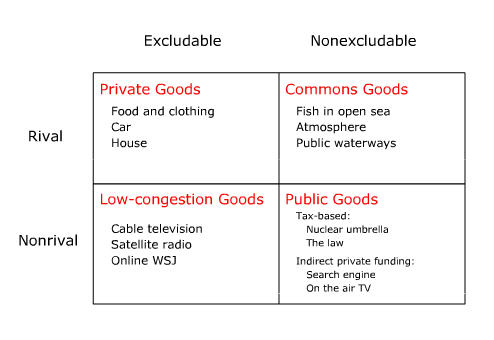He Who Pays the Piper
How on-the-air radio is indirectly funded affects the quality of radio programming as a public good.
Even to a casual listener, it is easy to tell the difference between public radio and commercial radio. Specifically, there are more ads and longer ads on commercial radio. The tone in which the ads are delivered is also more in your face on commercial radio. There is also a semantic difference. Ads on public radio are called sponsorships, not commercials.
But both public radio and commercial radio are public goods with indirect funding. Public goods are goods not subject to consumption rivalry. In other words, my consumption of the good does not reduce the quantity and quality of the same good to other consumers. The ways the radio signals are broadcast, there is also no way to deny the signals to non-paying listeners. But the cost of broadcasting the signals has to be paid for somehow. So both are paid for through indirect funding.
The indirect funding of commercial radio comes from commercials. To charge more for the commercial time slots, commercial radio is known to deliver programs that appeal to the largest number of listeners at the lowest possible common taste denominator. Although listeners indirectly fund the commercial programs through higher prices in the advertised products, there is no moral obligation to buy those products.
The indirect funding of public radio comes from government appropriations, individual donations, and commercial sponsorships. The mission of public radio is to deliver quality programming which should elevate the educational and civic standards of those who care to listen. Although the share of government funding has been declining to 20 -25% of the public radio networks' budget, government backing is essential to buttress the public mission of the enterprise. But as the share of government funding shrinks and the share of individual donations expands, the continued viability of public radio depends on the generosity of listeners. There is an unmistakable moral expectation to donate if one is not to be openly or secretly accused of being a free rider.
If listeners are not forthcoming with voluntary donations and public radio is forced to rely more on business sponsorship, the quality of public radio programming will be adversely affected. The most obvious quality deterioration is the increasing time devoted to on-the-air fund-raising and to sponsorship announcements. Increasingly, public radio and public TV in particular are broadcasting "junk" programs during fund-raising periods in order to attract fair-weather listeners and viewers. If this trend continues, die-hard regular listeners and viewers who actually donate generously will be turned off. Thus the vicious circle of low donations leading to lower quality which in turn leads to lower donations will be fully completed.
References:
- WSJ. 3/17/2006. "As sponsorship sales blossoms, public radio walks a fine line."
- Denver Post. 7/10/2005. "What U.S. public broadcasting really needs."
Glossary:
- consumption rivalryThe inability of a good to serve simultaneously more than one user without quality degradation. For example, there is consumption rivalry for an apple between more than one user. But there is no consumption rivalry for public radio signals among listeners. See also "private goods," "public goods," "low-congestion goods," and "commons goods."

- free riderA non-paying user of non-excludable goods, which may or may not be subject to consumption rivalry. Non-excludability may be due to a choice not to exclude even though it may be technically feasible to exclude.
- public goodsGoods that are not subject to consumption rivalry but cannot easily exclude non-payers either by design or due to technical difficulty.

Topics:
Keywords
ads, commercial, consumption rivalry, donations, free rider, free-rider, fund raising, fund-raising, indirect funding, public goods, public radio, quality programming, sponsorship
